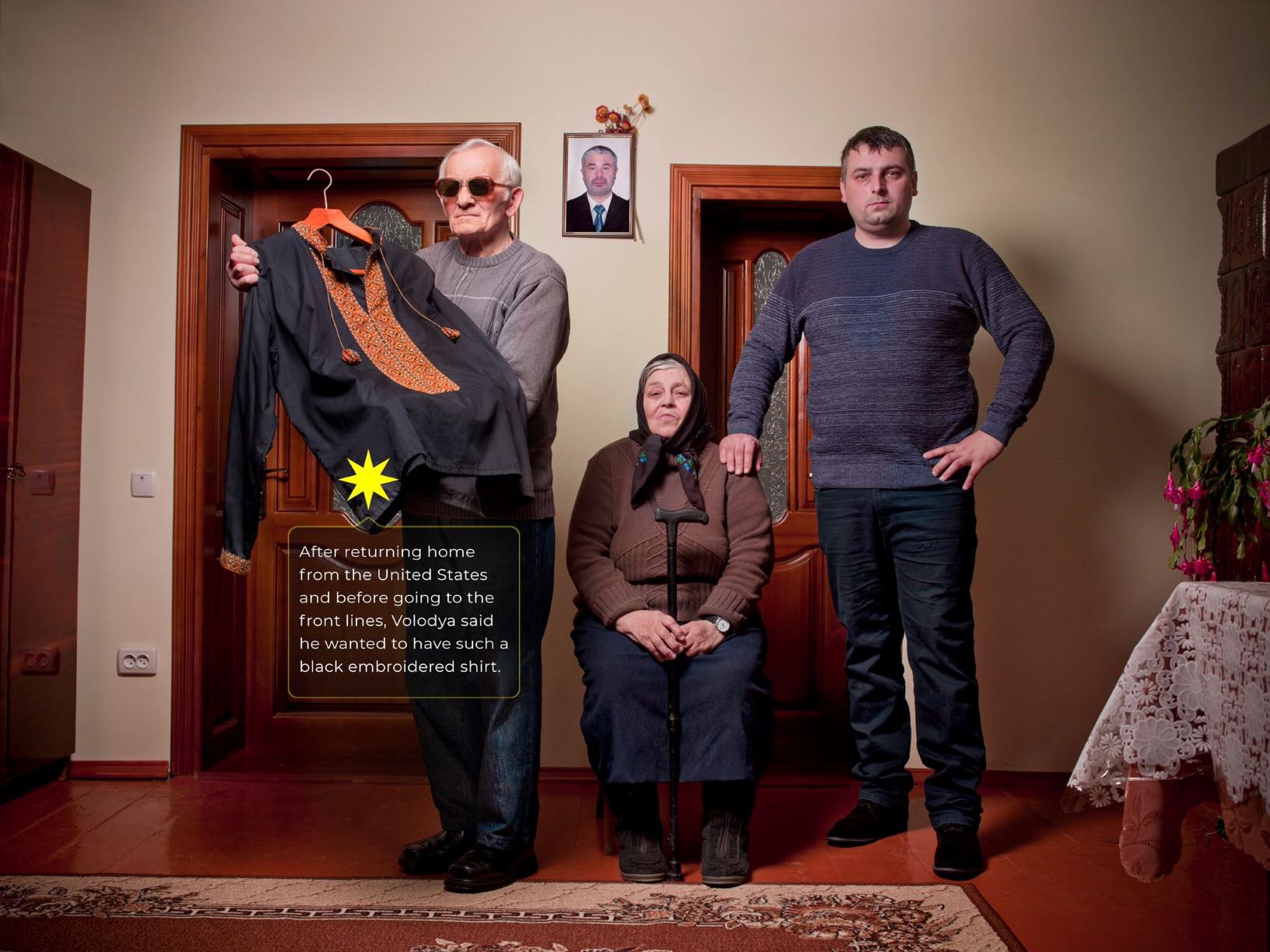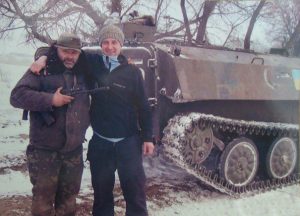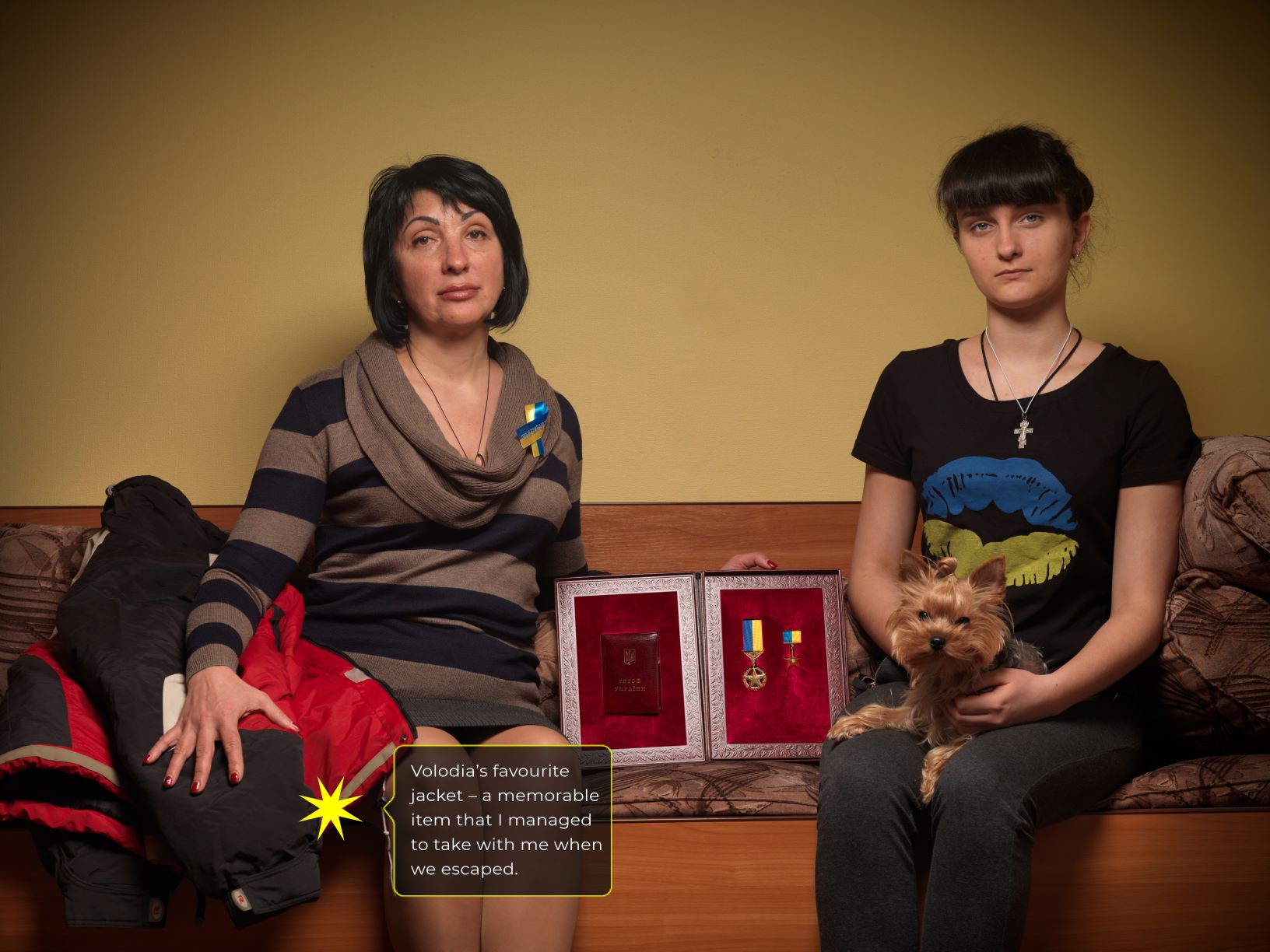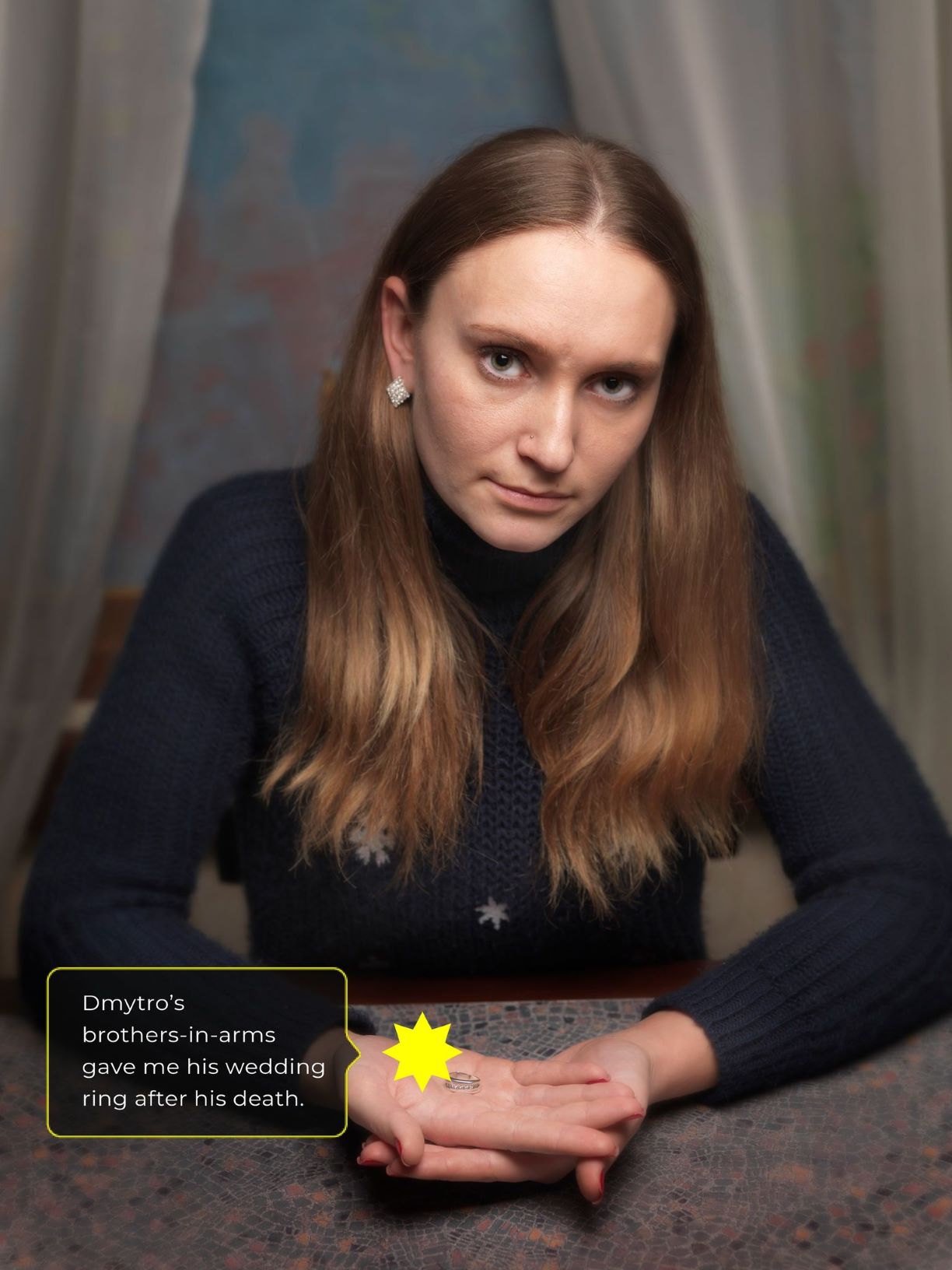Volodymyr Pytak was killed on January 25, 2015 in the battle for the Valera defensive position (height-307.5) near the village of Sanzharivka, Donetsk Oblast region), not far from Debaltseve. Six other Ukrainian soldiers were killed in this battle.
In that battle, pro-Russian militants stormed Ukrainian positions three times. During the third attack, an enemy tank began advancing towards the Ukrainian soldiers. Unable to stand it anymore, Volodymyr Pytak jumped out of the trench with a grenade in his hands, hoping to blow up the tank. He didn’t have time. A direct hit from an enemy grenade launcher killed Volodymyr on the spot.
It is part of the Plus 1 project created to memorialize the fallen Defenders of Ukraine.
Volodymyr Pytak
Author: Olha Dukhni
ch
Nobody knows where that shirt originally came from. An embroidered black shirt, blacker than night, as black as freshly-plowed arable soil. Or maybe from that song about the embroidered black shirts worn by Ukrainian heroes that his grandmother, an OUN leader, once sang. Or did she sing at all?
“Leave it there. I’ll wear it another time. There’s lots of time,” said Volodymyr Pytak with a smile.
But, his time ran out…
He brought it back in March 2014 when he returned home from Chicago. From Lviv Airport, he immediately headed straight for the military recruitment and enlistment office and signed up as a volunteer.

Before that, Volodymyr spent three long months talking anxiously with his brother Ihor. “Listen, are our people winning on the Maidan ?” He asked about this constantly and eventually bought a plane ticket, leaving behind ten years of living and working with a green card in America. A strange odyssey, a truck rolling across the East and West Coast of the United States. Through Detroit, Chicago, New York, Los Angeles, Chicago again. Rented apartments, new jobs and the habit of not seeking others, not looking for help, not asking.
-“Here, it’s every man for himself. No person - no problem. The family isn’t here, and you want to be your own man, give up everything you’re used to. Recently, I stopped at a local Protestant home; they had a lot of connections, and offered to help me with my career if I converted to their faith. But why should I? You can’t abandon what you are, who you are for the sake of some opportunities. This country [USA] is so big, so beautiful, but so strange and foreign. As soon as I have enough money, my family and I will open a service station in Darakhiv and we’ll live like normal people.”
-“So, maybe you’re thinking of getting married soon?”
-“I’ll get married as soon as I get back on my feet at home. The women in our village pester me about taking them to America, But, I want to live in Ukraine.”
 His younger brother Ihor remembers these short talks, but there aren’t enough of them, and he’s forgotten most. Ten years of Volodymyr’s life in America have been stored in a locked box; it can’t be opened right away.
His younger brother Ihor remembers these short talks, but there aren’t enough of them, and he’s forgotten most. Ten years of Volodymyr’s life in America have been stored in a locked box; it can’t be opened right away.
Neither Volodya nor his family had the desire to go to America. He applied for the green card lottery by accident. He worked in the Czech Republic for many years, got a job contract in Portugal, but something went wrong. Then, he just happened to apply for the green card that many dream of, and returned to Prague to earn some money. At home, a younger brother, his parents… it’s 2004, he had to earn more, to help them out. Then, one day, someone called up their neighbours in the village.
“Your Volodya just won a green card. He’ll be an American now.”
But, he did not become an American.
He flew to the States again with a dream - to earn enough money to open a service station in his native village, to support his family. He refused all outside help, useful ties and contacts.
“I don’t want to owe anyone any favours.”
He knew two words in English – “chicken” and “water”. It is only later that he was able to pick up the the language and act as translator for foreign journalists during the war. But, that was still a long way off.
 However, life is strange. Volodymyr lived in the States, but with his own kind, albeit aside and alone. He went to meetings organized by the Chicago diaspora, made friends with other immigrant workers, and listened to the Hadiukyny Brothers on night-long intercity trips. He read a lot, something that he loved from childhood, lots of books about Ukrainian history. During his service in the anti-terrorist operation in the Donbas, he overwhelmed his comrades-in-arms with his extensive knowledge of Ukrainian history, keeping them awake with his tales, arguing and thinking of what would have happened if Hetman Bohdan Khmelnytsky had not signed the Pereyaslav Peace Treaty with Moscow. Why have such a predatory and insidious enemy by your side? Ghostly historical issues that evaporated during the day to return late at night.
However, life is strange. Volodymyr lived in the States, but with his own kind, albeit aside and alone. He went to meetings organized by the Chicago diaspora, made friends with other immigrant workers, and listened to the Hadiukyny Brothers on night-long intercity trips. He read a lot, something that he loved from childhood, lots of books about Ukrainian history. During his service in the anti-terrorist operation in the Donbas, he overwhelmed his comrades-in-arms with his extensive knowledge of Ukrainian history, keeping them awake with his tales, arguing and thinking of what would have happened if Hetman Bohdan Khmelnytsky had not signed the Pereyaslav Peace Treaty with Moscow. Why have such a predatory and insidious enemy by your side? Ghostly historical issues that evaporated during the day to return late at night.
At school, he was called the “blue-and-yellow kid”. He was the first to wear a badge with a Ukrainian flag on his school jacket. Son of a member of Narodny Rukh (People’s Movement of Ukraine); grandson of his grandmother.
“When he joined the Maidan movement in 2004 (Orange Revolution), he told me that Yanukovych was just the beginning, that the Russians would wage war against us, and we should be prepared.” his brother recalls.
Indeed, Volodymyr was getting ready.
“I was working in a hardware store when the government announced the second wave of mobilization. I was ordered to report to the medical commission. Many guys were called up then; they were told to go home and wait for a call, but I was ordered to get ready for immediate deployment to a military unit. I barely had time to drive myself home and leave the car with the family. I called Volodya and told him I was leaving for the front” says Andriy Yurkiv, Volodya’s longtime friend and fellow villager.
Andriy continues his story.
“I’d just returned from the military recruitment and enlistment office when Volodya came to pick me up. He approached the military commissioner and asked him to allow me to remain at home, because I had a wife and two small children. He’d go instead. Well, the commissioner answered that I wouldn’t be released from military service because they needed strong, able-bodied men. Volodya drove home and for two whole months he stalked the military recruitment and enlistment offices. He saw doctors, was hospitalized and tried to get in shape. He so wanted to enlist! If only they would take him! Finally, at the end of July, he was able to join an assault infantry brigade.”
The money set aside for Volodya’s dream service station was partly used to purchase military gear. Volodymyr served in the 128th
Separate Mountain Assault Zakarpattia Brigade. He didn’t often call home. It was winter when he told his brother that they were standing near Debaltseve, fully equipped with weapons and ammunition.
“We called him 'Nimets' (the German). He loved everything German: German uniforms, German cars, and he was meticulous. He was technically skilled, knew everything there is to know about weapons - just like a German! We were all anti-aircraft gunners and Volodya learned everything about our ZU-23 (towed 23mm anti-aircraft twin-barreled autocannon) - how to assemble and disassemble this gun. It was always perfectly serviced.” recalls his comrade Borys Kholodioz.
 Kholodioz was the last person to see Volodya Pytak alive on January 25, 2015 in the battle for a 307.5-metre mound near Sanzharivka, Donetsk Oblast. Volodya died before his very eyes. In that battle, pro-Russian militants stormed Ukrainian positions three times. During the third attack, an enemy tank began advancing towards the Ukrainian soldiers. Unable to stand it anymore, Volodymyr Pytak jumped out of the trench with a grenade in his hands, hoping to blow up the tank. He didn’t have time. A direct hit from an enemy grenade launcher killed Volodymyr on the spot.
Kholodioz was the last person to see Volodya Pytak alive on January 25, 2015 in the battle for a 307.5-metre mound near Sanzharivka, Donetsk Oblast. Volodya died before his very eyes. In that battle, pro-Russian militants stormed Ukrainian positions three times. During the third attack, an enemy tank began advancing towards the Ukrainian soldiers. Unable to stand it anymore, Volodymyr Pytak jumped out of the trench with a grenade in his hands, hoping to blow up the tank. He didn’t have time. A direct hit from an enemy grenade launcher killed Volodymyr on the spot.
Far away, somewhere in Poland, Kholodioz sighs heavily into the phone and remains silent for a long time.
“You know, Volodya really liked the Ukrainian Insurgent Army song “Mashyngveri”. Whenever I have the chance, I visit his grave and sing it to him.”
Mashyngveri, Shturmgeveri (Maschinengewehr is German for “machine gun”, Sturmgewehr – “assault rifle”)
Open the door, you slime!
We’ve come to get you, heya, hoya.
Your blood will flow, it will freeze,
Someone will be hanging from the tree.
We’ve come to get you, heya, hoya…
The song lingers over the grave of Hero of Ukraine Volodymyr Pytak, over his native village, the Brushnytsia River, the old cemetery, and the new service station built by his brother Ihor Pytak, the same one that his older brother dreamed of owning.

The project is built around 22 individual exhibition stands. In iconic and powerful moments captured by a photographer’s camera – Youry Bilak, a Frenchman of Ukrainian descent – Ukrainian families tell the stories of their loved ones – Ukrainian soldiers who perished in the war. Each narrative, each individual is but one small grain, one tiny unit of a module in a living organism. By telling his story, we bring him back to life.
Each family chose an object that most reminds them of their departed: a father’s jacket, a guitar, a suit of medieval armour, a book. These family artifacts reflect a living continuation of the departed loved one. Ukrainian artists, intellectuals, and journalists were invited to create original texts about each soldier.





